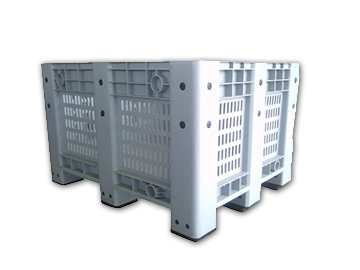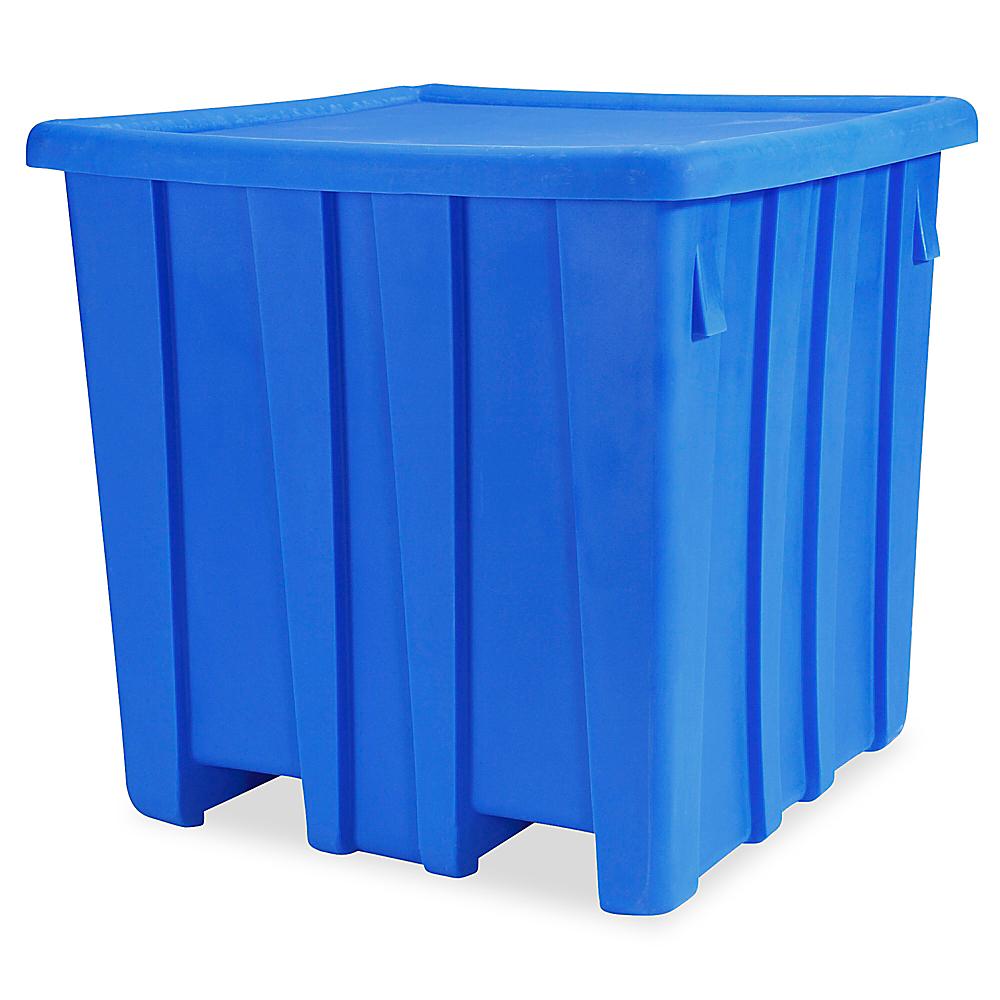A detailed look at bulk plastic containers for sale and their practical uses
The Duty of Bulk Plastic Containers in Effective Recycling Practices and Sustainability
Bulk plastic containers are integral to modern-day reusing efforts. Their design enhances the efficiency of product collection and transport, adding to sustainability objectives. These containers not only maximize area however likewise assist in checking contamination degrees. However, their implementation is not without obstacles. Recognizing the full scope of their influence discloses a complicated relationship between logistics and environmental responsibility that calls for additional exploration.
Recognizing Mass Plastic Containers
Mass plastic containers work as an important component in different markets, helping with the storage space and transportation of goods. These containers are commonly made from robust products such as high-density polyethylene (HDPE) or polypropylene, which supply sturdiness and resistance to environmental variables. Their style often includes attributes like stackability and modularity, permitting efficient use room throughout both storage space and transit.
Industries such as agriculture, food handling, and making regularly make use of mass plastic containers because of their lightweight nature and ease of handling. The containers can be found in various dimensions and arrangements, satisfying the specific demands of different products. Their convenience expands past simple capability; they can likewise be customized with lids, deals with, and classifying options to improve functionality - bulk plastic containers for sale. Therefore, mass plastic containers play a vital duty in optimizing logistics and supply chain procedures across several markets, thereby contributing to general performance and cost-effectiveness
Benefits of Utilizing Bulk Plastic Containers in Recycling
The utilization of bulk plastic containers substantially improves the performance of the procedure when companies focus on recycling efforts. These containers are designed to optimize area, enabling for the storage and transport of larger amounts of recyclable materials. This leads to fewer trips to recycling centers, thus minimizing gas consumption and linked emissions.
Additionally, mass plastic containers are sturdy and immune to different environmental elements, guaranteeing that materials continue to be secured throughout handling and transportation. Their light-weight design further adds to lower transportation expenses.
The uniformity of these containers promotes much better sorting and processing of recyclable products, which can improve overall recycling prices. Organizations that adopt bulk plastic containers likewise demonstrate a dedication to sustainability, positively affecting their brand picture. Ultimately, these advantages not just improve reusing methods but additionally contribute to broader environmental goals
How Mass Plastic Containers Facilitate Product Collection
Reliable product collection is greatly improved by the use mass plastic containers, as they offer a structured and reliable service for gathering recyclable products. These containers are designed to suit large volumes of products, which simplifies the sorting and storage space process. Their stackable design takes full advantage of room use, making it much easier for centers to organize recyclables without mess.
On top of that, bulk plastic containers are resilient and weather-resistant, enabling for exterior positioning without degradation. This strength assures that materials stay safeguarded up until they are collected for handling.

The harmony in shapes and size of these containers facilitates standardization throughout collection factors, enabling much better tracking of recyclable quantities. Their transparent nature enables for simple exposure of components, aiding in the monitoring of contamination levels and ensuring that only suitable materials are accumulated. In general, mass plastic containers play a vital role in streamlining the material collection process, consequently advertising reliable recycling practices.
Transportation Efficiency and Environmental Impact
Transport efficiency plays a necessary duty in the reusing procedure, specifically through the optimization of lots capacity wholesale plastic containers. By making best use of the quantity of material carried, firms can considerably lower the number of trips needed, thereby minimizing their carbon impact. This method not just enhances functional efficiency yet also adds to a lot more lasting ecological techniques.

Optimizing Load Capability
Enhancing lots capacity is commonly ignored, it plays an important function in enhancing transportation effectiveness and lessening ecological influence in recycling practices. By taking full advantage of the quantity that mass plastic containers can hold, recycling operations can reduce the variety of trips needed for transport. This not only decreases fuel consumption yet also decreases the damage on automobiles. Efficient load monitoring enables centers to use room properly, making sure that each transport cycle is as efficient as possible. Furthermore, well-optimized lots can cause better negotiations with logistics carriers, potentially minimizing general prices. Eventually, boosting load capacity contributes to an extra lasting reusing system by cultivating efficient resource usage and minimizing waste generated during transport.
Minimizing Carbon Impact
As reusing operations endeavor to minimize their ecological effect, minimizing the carbon impact connected with transport arises as a vital goal. Mass plastic containers play a critical role in accomplishing this purpose by boosting lots performance and optimizing logistics. Their lightweight yet durable design enables maximum cargo area usage, reducing the variety of journeys called for to transport products. By combining deliveries, reusing centers can lower fuel intake and greenhouse gas exhausts. Additionally, purposefully locating recycling centers decreases transport distances, additionally lowering carbon results. Utilizing fuel-efficient lorries and different power resources improves overall sustainability. By incorporating these techniques, the recycling sector can substantially reduce its carbon footprint, adding to a more sustainable future.
Difficulties in making use of Bulk Plastic Containers

Contamination Issues
Contamination concerns represent a considerable obstacle in the effective use of mass plastic containers within recycling practices. These containers usually build up residues from previous components, bring about mixed products that can hinder the recycling procedure. Contaminants such as food waste, chemicals, or non-recyclable materials can jeopardize the stability of the entire batch, leading to increased disposal expenses and decreased reusing rates. In addition, inappropriate cleansing or sorting can aggravate these concerns, making it hard for recycling facilities to refine products efficiently. The presence of contaminants not only influences the quality of recycled products but likewise weakens the total sustainability initiatives intended at lowering plastic waste. Attending to these contamination difficulties is critical for improving the efficacy of mass plastic container recycling.
Recycling Infrastructure Limitations
Inadequacy in recycling facilities positions substantial obstacles for the efficient monitoring of mass plastic containers. Several reusing facilities lack the capability to process huge quantities of these containers effectively, resulting in increased delays and costs. Moreover, poor arranging modern read the full info here technologies often bring about contamination, as mass containers might be combined with other materials, making complex the reusing process. Limited transport choices also prevent the movement of bulk plastic containers to proper reusing centers, resulting in raised garbage dump waste. Furthermore, an absence of standardized protocols for bulk container reusing develops confusion among customers and organizations, even more making complex initiatives to advertise sustainability. Resolving these framework restrictions is important to improve reusing techniques and maximize the capacity of bulk plastic containers in look what i found a round economy.
Ideal Practices for Applying Mass Plastic Containers
They need to prioritize a strategic method that improves performance and decreases contamination risks when organizations think about applying bulk plastic containers in their recycling methods. First, choosing the proper container size and kind is vital to suit the volume of materials being refined. Organizations needs to additionally develop clear labeling and signage to lead individuals on appropriate disposal techniques, lessening complication and errors. Routine training sessions for team can additionally enhance these techniques, making certain every person comprehends their functions in preserving recycling stability.
Additionally, companies must execute a regular maintenance routine to examine and clean containers, stopping the buildup of contaminants. Partnering with local reusing centers can additionally streamline the collection process, ensuring that materials are effectively processed. Organizations should keep an eye on and assess their reusing metrics, utilizing this information to fine-tune techniques over time and promote continual renovation in their sustainability efforts.
The Future of Mass Plastic Containers in Lasting Practices
As companies significantly focus on sustainability, the function of bulk plastic containers in reusing practices is readied to advance considerably. Developments in materials scientific research are causing the development of naturally degradable and recyclable alternatives, boosting the ecological advantages of bulk plastic containers. In enhancement, the execution of closed-loop systems will certainly enable for much easier collection and repurposing of these containers, lowering waste and source intake.
Technological innovations, such as wise monitoring systems, will certainly make it possible for companies to monitor the lifecycle of bulk containers, improving performance in recycling procedures. As consumer demand for lasting practices expands, companies will likely embrace mass plastic containers designed for reuse and long-lasting worth. Additionally, collaboration in between federal governments and sectors will certainly promote the facility of standard reusing protocols, making sure that bulk containers are efficiently integrated into broader sustainability initiatives. Overall, the future of mass plastic containers appears appealing, with substantial capacity for adding to a round economy.
Regularly Asked Questions
Exactly How Are Mass Plastic Containers Made and What Products Are Utilized?
Bulk plastic containers are usually made from high-density polyethylene (HDPE) or polypropylene (PP) These materials are processed with shot molding or impact molding strategies, resulting in resilient, light-weight containers suitable for numerous storage space and transport needs.
Can Bulk Plastic Containers Be Reused Numerous Times Before Recycling?
Yes, bulk plastic containers can be recycled multiple times prior to reusing. Their resilience and layout enable for repeated usage in numerous applications, promoting sustainability and source performance while decreasing the demand for brand-new containers.

What Certifications Exist for Mass Plastic Containers in Recycling?
Numerous accreditations for bulk plastic containers include the Recycling Partnership's certification, the Cradle to Cradle Licensed ™ requirement, and the Sustainable Product packaging Coalition's standards, ensuring containers satisfy particular environmental and recyclability criteria for efficient recycling.
How Do Mass Plastic Containers Compare to Various Other Recycling Storage Space Options?
Mass plastic containers use better durability and capability compared to other recycling storage space options, reducing the threat of contamination click resources and promoting efficient transportation. Their layout supports much better organization, enhancing total effectiveness in recycling procedures.
What Is the Lifespan of a Bulk Plastic Container in Recycling Processes?
The life expectancy of a mass plastic container in recycling processes generally ranges from 5 to 10 years, depending upon usage, material quality, and ecological conditions, permitting for numerous cycles of use before ultimate disposal or recycling.
When companies prioritize reusing initiatives, the usage of bulk plastic containers substantially improves the performance of the process. Transport performance plays a vital function in the reusing process, particularly through the optimization of lots capacity in mass plastic containers. The use of bulk plastic containers in reusing techniques encounters significant difficulties, specifically worrying contamination concerns and limitations within recycling facilities. Contamination concerns represent a significant challenge in the effective use of mass plastic containers within recycling techniques. When organizations consider carrying out bulk plastic containers in their recycling methods, they should focus on a critical strategy that enhances effectiveness and decreases contamination risks.